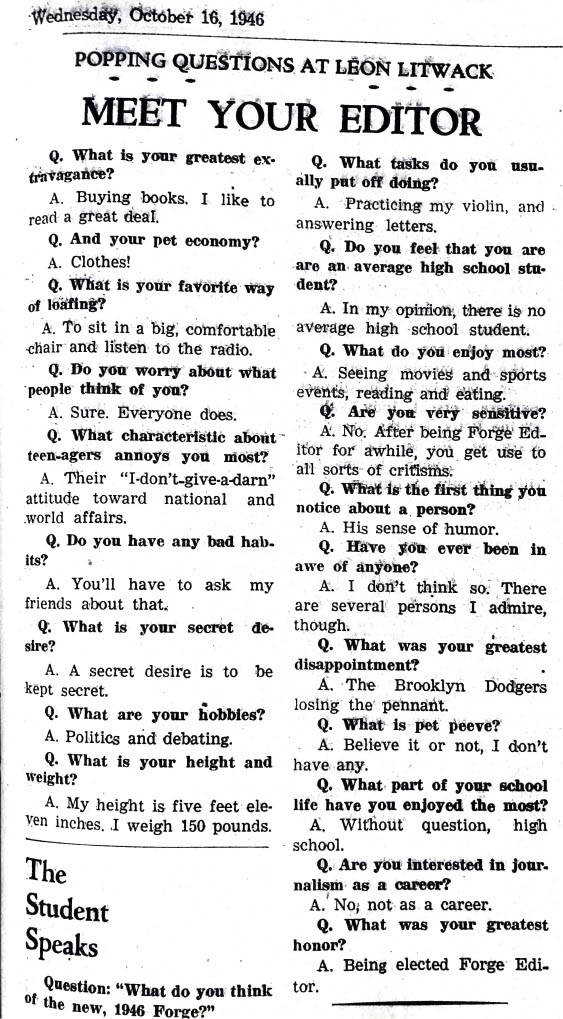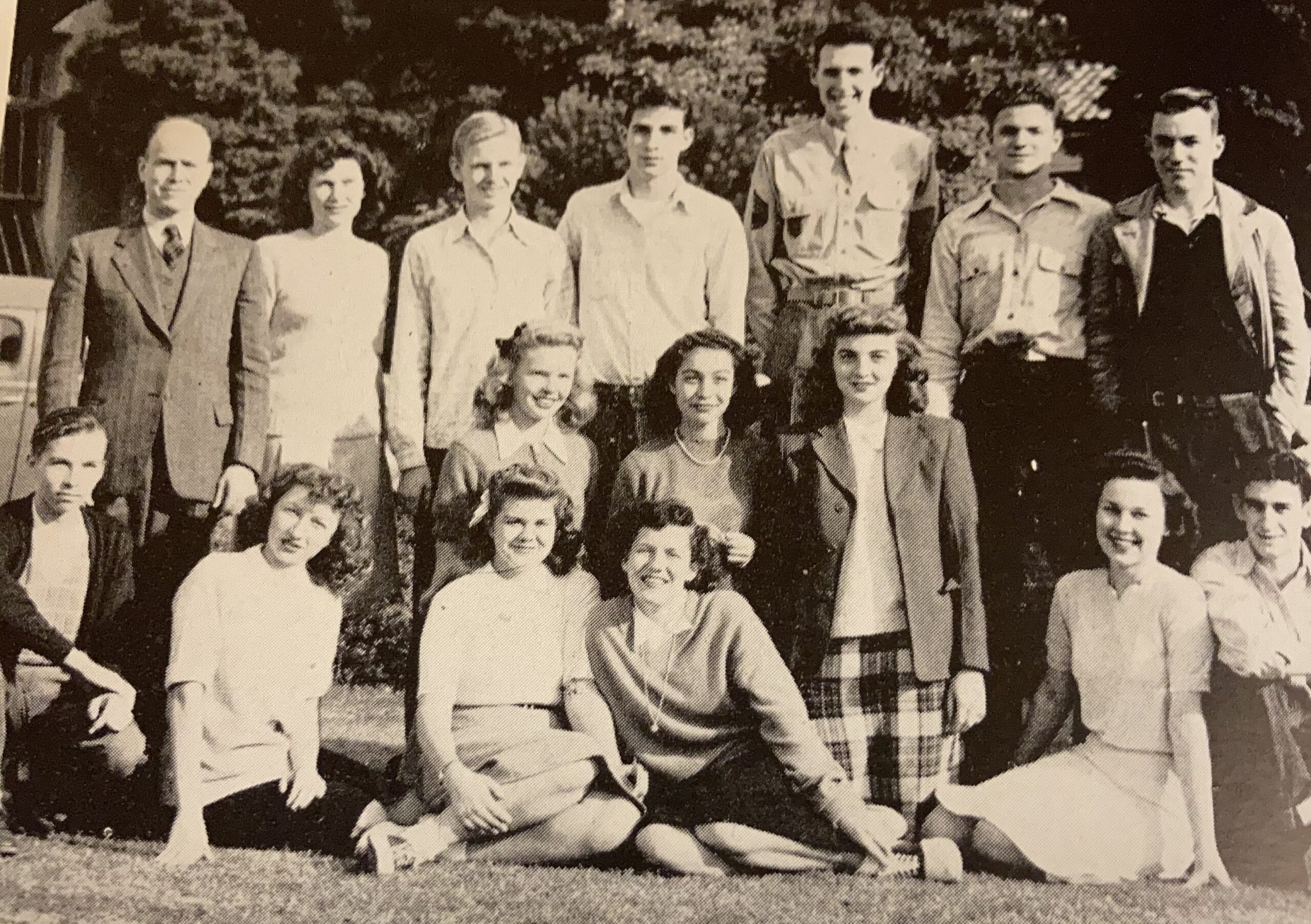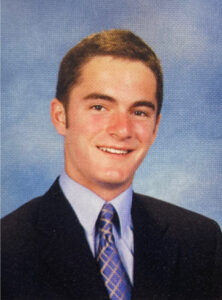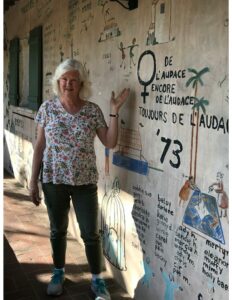Leon Litwack, top right, pictured here in a group yearbook photo with The Forge staff of 1946-47
Leon Litwack, Pulitzer-prize winning historian, professor, SBHS alumni, and former Editor-in-Chief of The Forge, passed away on August 5th, 2021, at the age of 91. A prolific author, professor, and outspoken proponent for social justice, Litwack dedicated his life to telling the untold stories of American history.
Born in Santa Barbara as the child of Russian immigrants, Litwack grew up in a diverse community of other immigrant families and children. Litwack reflected on his time in the neighborhood in a 2001 interview*, saying, “—I would listen to their parents talk about their experiences, as I listened to my mother and father talk about their experiences. All their stories fascinated me. I still would say to this day that those stories are what drove me to history, because, as I soon came to discover, historians had excluded these voices from their narratives.” As a historian, he strove to correct those exclusions in his written works, winning the Pulitzer Prize for his third book, “Been in the Storm So Long: The Aftermath of Slavery”.

Before he became such a prolific author, Litwack was a student at Santa Barbara High School. As a freshman, he elected to take a journalism class in place of English. Litwack, having seen the Alfred Hitchcock thriller, Foreign Correspondent, entertained ambitions of becoming a journalist. In his senior year of high school, Litwack was elected Managing Editor of The Forge. Under his direction, the paper’s coverage of school and national politics garnered praise. The school administration, however, attempted censure. The Forge, led by Litwack, would call for the removal of the color barrier in Major League Baseball, revamping of the demerit system, and an end to compulsory military training. The Forge received a flurry of letters to the editor, and the editor was invited into the Vice Principal’s office to speak in person. Litwack reflected: “He would call me into his office. He would talk about what we were doing and threaten to shut the press down.” Then Litwack would get called in to talk to the Principal, who would say, “Now Leon, here we go again” and then tell Litwack of the calls he was getting -not from the student body, but from veterans organizations and business groups. The Principal wouldn’t shut the paper down, but he would warn Litwack: “You just go back there, and try to be careful.” Litwack didn’t listen. The paper continued on.
Ever the disruptor, Litwack continued to come in conflict with authorities. He was fired from a job at the Berkeley campus library, after he refused to sign a loyalty oath which targeted membership in communist organizations. Later, like many progressive activists during the McCarthy era, he was called to testify in front of the House Committee on Un-American activities. Litwack, of course, viewed the upsetting of authorities as a badge of pride. After 9/11, it emerged that a political group founded by Lynne Cheney, wife of then-Vice President Dick Cheney, had written a list of prominent critics of the Bush administration. Litwack, who at the time was taking a break from teaching, was upset at his lack of inclusion. This was the way he was: dedicated to calling out the abuses and injustice of the powerful, and devoted to fighting it.
Throughout his many years at Berkeley, amidst authoring several books, articles, and briefly serving as the President of the Organization of American Historians, Litwack taught a rough estimate of 30,000 students. His class, an introductory course on U.S. history after the civil war, was a performance. Litwack would stride up to the stage, later on to a thematic soundtrack of blues or rock, and lectured passionately on those whose experiences had been excluded in retellings of the past. For many of his students, it would be one of the only history classes they took. Litwack made sure it had an impact. In many ways, he retained the spirit of a journalist throughout his life. When teaching history, Litwack did not just focus on the reiteration and reanalysis of the same set of facts. Instead, he strove to tell stories – the stories of immigrants like his parents and neighbors, the experiences of black Americans as something other than an accessory to the white narrative, and, of course, the working class who his high school history teacher had so bitterly accused him of being an advocate for.
*Leon Litwack “HISTORIAN OF THE AMERICAN PEOPLE AND THE AFRICAN AMERICAN EXPERIENCE, PROFESSOR AT BERKELEY, 1964-2007” conducted by Ann Lage in 2001-2002, Regional Oral History Office,TheBancroft Library, University of California, Berkeley, 2014.

In order to honor his legacy, The Forge has included with this article a selection of Mr. Litwack’s articles, with more being made available under the archives section here on our website. Ranging in topics from football to politics, these works provide additional context to his legacy. An interview with Litwack during his time as editor of The Forge has also been included.
[Image Credit SBHS Yearbook Archives, Curated by the SBHS Alumni Association. 1946-47 Articles by and About Litwack Courtesy of The Forge Archives]






Be First to Comment